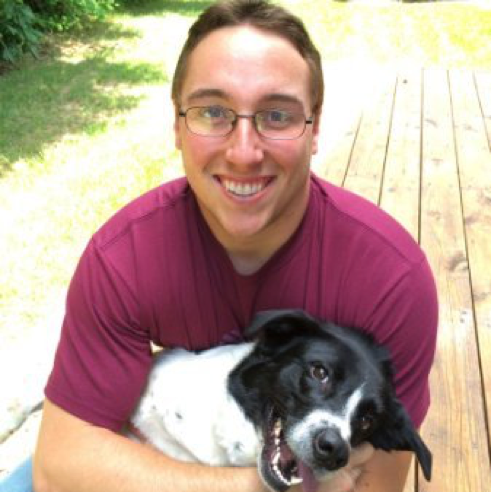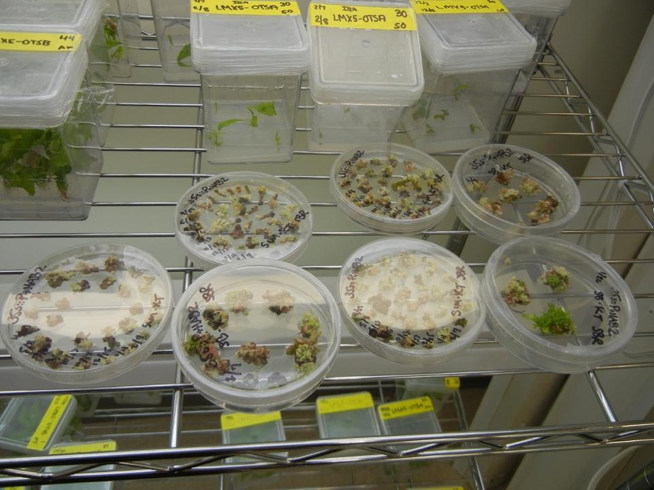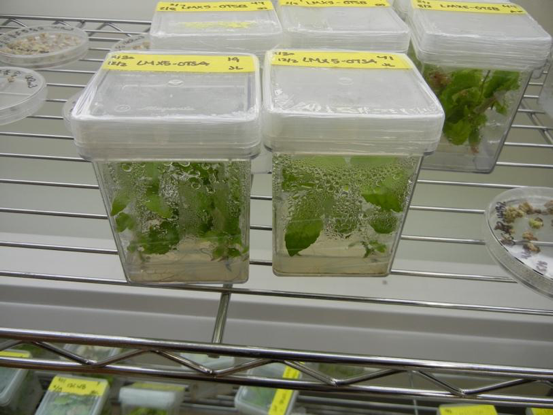Stephen Rigoulot
A Plant-Protein Relay Race: How Plants Adapt to Their Surroundings through Internal Communication

Imagine you are at a relay race. The first runner takes off at the sound of the starting gun, holding the baton as he runs around the track. When he reaches the next runner, he passes the baton, and that runner takes it the next leg. Each team member passes the baton to the next until the final runner crosses the finish line.
Now imagine the cells of a plant growing in an area experiencing a drought. If the roots of the plant do not get enough water, they will produce special compounds to let the rest of the plant know that something is wrong. Just like in the relay race, these special compounds act as the starting gun. These compounds produced in the roots are passed through the plant to receptor proteins in the leaves where a molecular relay race begins, triggering physical changes in the plant to make it better able to survive the drought conditions.
One such special compound is called abscisic acid, or ABA, and is the focus of the studies done by Stephen Rigoulot, a Horticulture Ph.D. student in the College of Agriculture and Life Sciences. Rigoulot studies how plants “talk to themselves,” as he says, or how plants know to react and adapt to their surroundings.
“It’s like a very complicated relay race where any runner (protein) can pass the baton or “signal” to numerous runners at any stage of the race,” said Rigoulot. “My job is to figure out which proteins are involved in passing the signals that control plant adaptation to adverse stress conditions.” He explained one such example by saying, “The leaves will detect the elevated ABA levels, and ultimately through some of these signaling pathways, the plant will regulate water conservation by closing pores on its leaves. That’s crazy, right? Isn’t that cool?”
Rigoulot’s research also looks at what else ABA does, such as what kinds of things it prompts the plant to do in response to droughts in not only the leaves, but the wood tissue. He studies how the xylem, the straw-like structure that moves fluid through the plant, is affected.
Rigoulot wasn’t always a plant scientist, though. His love for all sciences first led him to start college at Salisbury University with the plan to become a medical doctor. Through the help and guidance of his undergraduate advisors, he realized his interest in plants on a cellular and genetic level. When an opportunity in the form of a weekend retreat came up to explore Virginia Tech graduate programs, his mentors encouraged him to go.
“When I got here, it was the people in this program that made me fall in love with it,” Rigoulot said. “Everyone here is so passionate about the research they’re doing. Anyone you talk to about the Translational Plant Sciences program and what exactly it means to them, you hear ‘community’ or ‘team,’ where other graduate programs didn’t seem like that at all. You get the impression from graduate school that you come in, don’t know anybody, and you are kind of isolated in your lab for the duration. It couldn’t be farther from the truth here in TPS, and this has helped me flourish as a grad student.”
Rigoulot, now studying at Virginia Tech, has found support in the PIs, lab techs, and fellow graduate students he’s met here, including his advisors, Drs. Amy Brunner and Eric Beers, as well as Xiaoyan Sheng and Earl Petzold, the managers of the laboratories in which Rigoulot works in Latham Hall.
“I came in in a class of five, and these are some of the best friends I’ve ever made,” he said. “I’m actually roommates with one of the people that I came into this program with. But yeah, I definitely felt welcome and valued from the start. There was never a time when I thought ‘well, I don’t think I can do it here.’”

To conduct experiments, Rigoulot grows Populus trichocarpa or black poplar “mini-forests” with a twist. He modifies the genes that contain the blueprints for proteins which function in the ABA response pathway, and then he observes the effect this has on the plant’s ability to handle a drought.
In doing this, Rigoulot created what he calls gene “over-expression” experiments; he explained these by saying, “basically I turn the volume of selected genes all the way up and then see how that affects plant growth.”
Rigoulot’s hypothesis in these experiments is that the changes “will generate a plant which has an altered and possibly improved drought tolerance.” This hypothesis hints at the usefulness of his research: while these transgenic plants may not be used commercially, he knows it will be useful for growers working to adapt their plants to changing climates and land area pressures caused by the world’s booming population.
“We’re establishing this base of knowledge about a stress response to identify points where you can manipulate it,” said Rigoulot. “Can you make it better? Can you communicate the signal the plant’s trying to send faster than it had previously? Can you mitigate the negative aspects of stress response?” Consequently, Rigoulot spends a lot of time in the lab identifying the specific proteins that interact to transmit information about drought.
Because Rigoulot modifies the genes of poplars, his research technically uses genetically-modified organisms, or GMOs. Genetic modification has already been used to solve problems in farming and agriculture for crops other than those Rigoulot has studied. Application of these technologies have even made it possible to engineer additional nutrients into plants. The best example of this is the case of golden rice which contains the gene necessary to synthesize beta carotene, a precursor to Vitamin A. These transgenics were created to combat Vitamin A deficiency in third world countries which can lead to blindness. There are many areas which GMOs can make an incredible difference, but they have been stigmatized due, in part, to the lack of understanding of the science behind GMOs, Rigoulot says.

“Science education is incredibly important, [and] things like this [interview], talking to people,” said Rigoulot. “I think it’s important to communicate that I’m a normal person, too, and I have the same concerns that you do about food security, or being able to feed people safely. We need people that do the scientific education and communication in writing to foster trust between scientists and the everyday person who can benefit from this research.
It’s ultimately up to the community to determine where the science will go next. While Rigoulot is not afraid of GMO, he is optimistic that even if people decide that GMO isn’t the best option, scientists will keep finding new ways to solve food security problems. “If people don’t like it, we’ll find something else. We’ll find what works.”
Ultimately, science is what Rigoulot loves to do. He says that it is only made possible by the people around him who also make it that much more enjoyable to make new discoveries about the fascinating genes and pathways he studies.
“I have fun doing my job,” said Rigoulot. “I have fun looking at genes and looking at the intricate ways plants can talk to themselves and modulate their activity accordingly. I think it’s elegant."
Q&A: Meet Steve
Hometown: Snow Hill, Maryland
Major: Graduated with a Bachelor’s Degree in Biology from Salisbury University, Currently a Ph.D. Student in the Department of Horticulture at Virginia Tech
PIs: Amy Brunner and Eric Beers
Laboratory and research location: Latham Hall
What do you plan to do after graduation?
“I think I want to move into the private sector. We went and visited a local biotechnology company’s facilities where there were amazing technologies and things that I would love to work with. Recently, I learned how to start analyzing some of the big data that our group has generated, and honestly I think that in the future a lot of the decisions on which genes to look at are going to be made following that sort of analytical process. I hope that my work will be finding the needle in the haystack in these big data sets and then being able to characterize the gene with the skills I’ve acquired over my graduate career. For my project, I’ve cloned upwards of 45 genes—I think I’ve been successful with that so far because I love doing that kind of work. …My hope for the future is that I remain somewhere close to a lab bench and doing the wet lab science. A fine balance of computational awesomeness and laboratory work would be my ideal situation.”
Would you ever be a professor?
“I’m not putting it off the table, that’s for sure. I would probably approach it the same way I’ve approached this interview and just try and tell you about the cool parts of everything.”
Stephen would like to thank his girlfriend Kerry, his advisors from Salisbury University, Les and Patti Erickson, his PIs Amy Brunner and Eric Beers, parents John and Betty Rigoulot, his sister Shelby, as well as all his friends, family and coworkers for their continuous support.
Article written by Amanda Bouvette while participating in ENGL 4824: Science Writing in Spring 2017 as part of a collaboration between Fralin and the Department of English at Virginia Tech.




